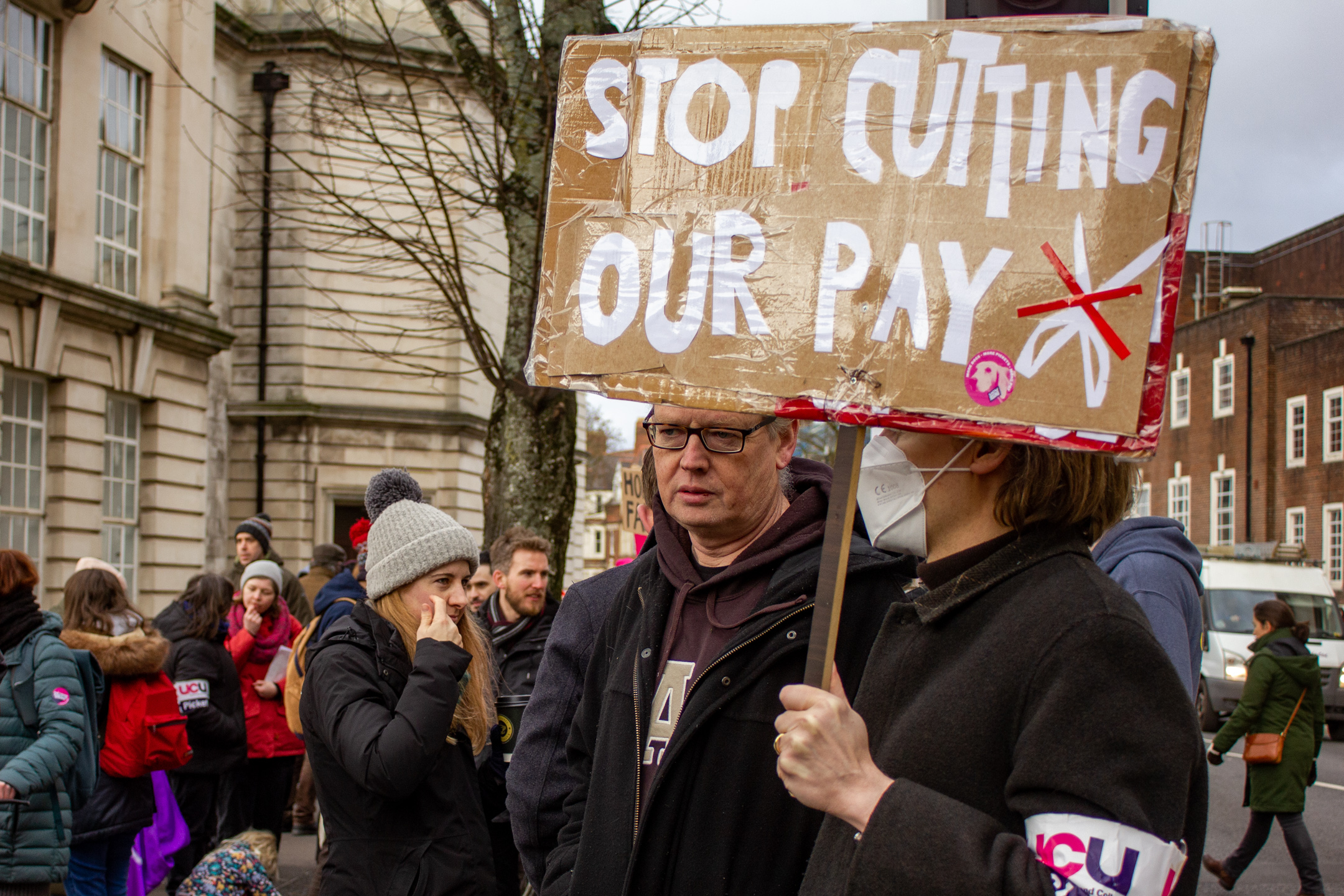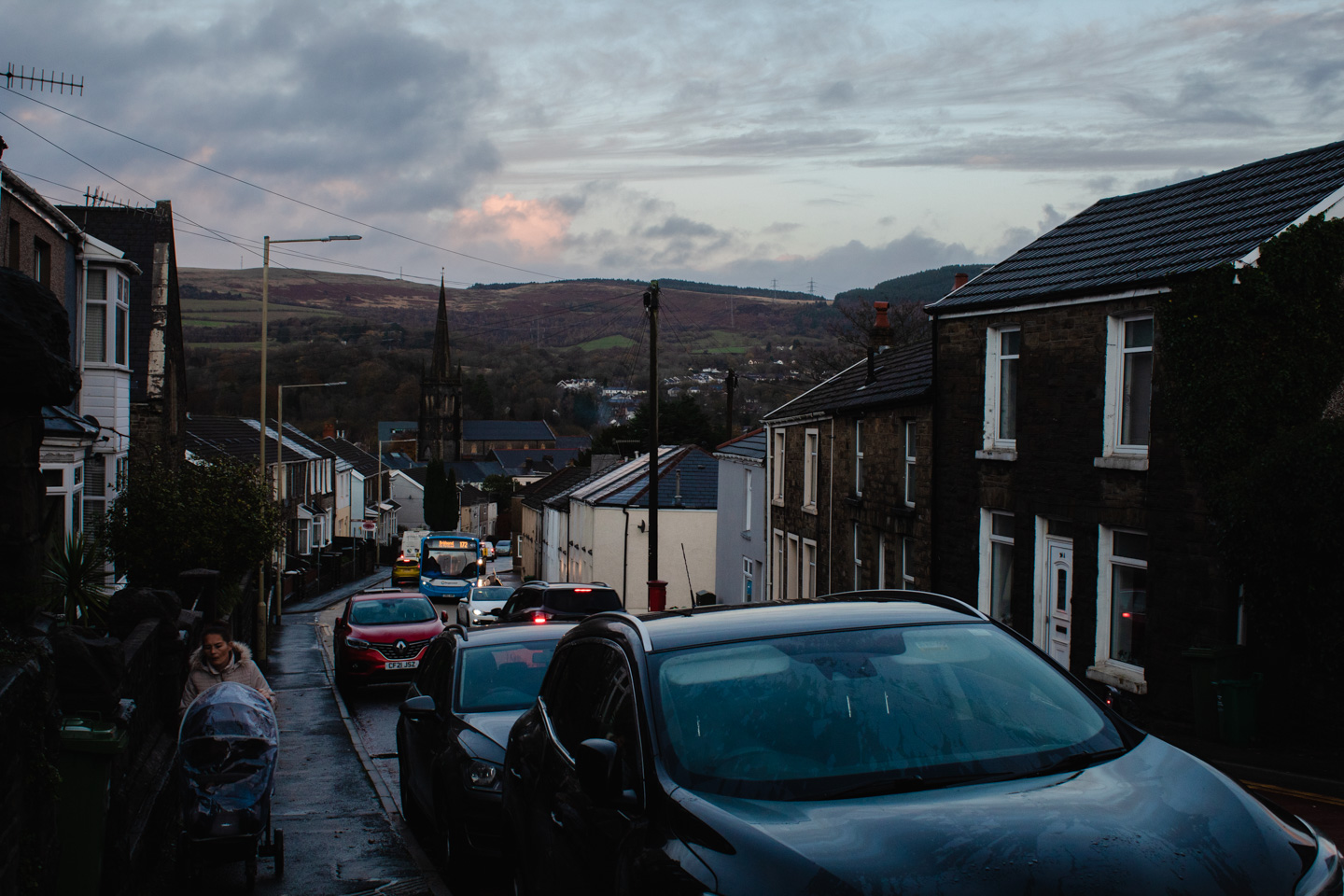
“We Should Escalate, Not Stop” – Trade Unionists Left Frustrated Over Cancelled Strike Days
Recent months have seen thumping strike votes delivered by workers who want to fight against years of falling pay and worsening conditions. But some have also been left frustrated that strikes have been suspended by union leaders at short notice. Rank and file workers shared their feelings about the situation with voice.wales
By SC Cook. Cover image: workers strike on Feb 1st, by Adwitiya Pal
Catherine has been a teacher for almost thirty years. But in that time, she’s seen first hand what’s happened to the profession she’s dedicated her life to.
“The education service is being run down all the time,” she says.
“It’s the difference between the workload and the fact that we’ve had pay losses for so many years.”
Catherine says that many of her colleagues are now in fuel poverty, due to the pay freezes and paltry increases they’ve had for so many years colliding with the soaring cost of energy.
But as pay has gone down, workload has increased as teachers and teaching assistants are left to pick up the pieces of the stripping out of the social state.
“We’ve had to take on a lot of the role of the support services that used to exist from the council and charities and wherever else,” she says. “Now teachers are taking on those roles because there is no one else to do it.”
This was the backdrop to a resounding vote for strike action by members of the NEU at the start of the year.
In Wales, 92.28% of teachers voted in favour of strike action on a 58.07% turnout.
“It’s a number of things, it’s not as simple as just pay,” says Catherine, explaining the mood amongst her co-workers that brought about the result. “There’s a definite sense they’d had enough.”
But despite such a thumping result in favour of action over two months ago, walkouts have been limited to just two days of strikes held one month apart.
This is because three planned strike days in Wales have been called off as the NEU agreed twice to suspend action whilst it consulted its members on a Welsh Government pay offer.
Since becoming a teacher in 1995, Catherine has always been a member of the NEU and its fore-runner, the National Union of Teachers (NUT).
But she’s been left frustrated by the decision of the union’s leadership to cancel strikes on two occasions.
“I don’t think we should have paused at that point,” she says of the first strike cancellation, “because the offer wasn’t good enough. It was only 1.5% more [on pay] and a one off of 1.5%”
Catherine was angry at the leadership accepting what is becoming a common demand of government and employers- to pause strikes whilst a new offer is voted on.
“I don’t think we should pause every time they give us an inadequate offer,” she says. “Because that’s a very good way of undermining action, isn’t it? It’s a very good way of stopping people from striking.”
The first deal was roundly rejected, and NEU members were back on strike again on March 1st, and were preparing for an escalation in action with two days of back-to-back walkouts on March 15th and 16th.
But this was again called off in order for members to vote on a deal that many felt was very similar to the first – which they had already voted against.
“I can’t see that it’s any better and if anything, it’s worse because it’s tied us into 5% next year and we don’t even know what inflation will be next year,” says Catherine.
“I think we should be escalating the action, not stopping it.”
According to Lianne, a union rep and NEU member of 18 years working in a secondary school in Caerphilly, many workers feel the same.
“Most of my members feel that the action shouldn’t have been paused and are ready to keep fighting,” Lianne told voice.wales. “None of my members have suggested that they feel we should accept the offer.”
She adds that the current offer won’t fix the recruitment crisis in schools, which recently saw her school fail to recruit to a full time, permanent post.
Seeing the offer won by teachers in Scotland – where teachers will receive a 7% pay rise backdated to last April, a further 5% next month and 2% in January. -has also spurred workers in Wales to fight for more.
“The general response has been that teachers in Wales shouldn’t be valued as less than teachers in Scotland,” says Lianne, “and that the NEU leadership should continue to fight for at least the same offer as Scotland.”
A third teacher, Caroline, from Carmarthen told voice.wales that she would be voting against the deal. “An extra 1.5% is far from an acceptable pay offer and the strike action should not have been paused. It is my view that strike action must continue until members vote to accept an offer,” she said.
But it is not just the National Education Union where tensions between the rank and file and the union leadership have emerged over strikes being suspended.
In the University College Union (UCU), there was widespread anger when what had been planned as a wave of escalating strikes in February was put on ice in order for talks to be held between employers and unions, without any new offer having been secured.
Many members were annoyed not only at the planned action being suspended at short notice, but also the way the decision was made.
“Members were quite upset that it appeared to be taken in a top down way, so it wasn’t very democratic,” says Anita Pilgrim, a lecturer at the Open University for 18 years and the equalities officer for the Open University UCU branch.
“People were not convinced that there was enough to take a pause.”
With strike action suspended, and ACAS brought in to facilitate talks, employers took advantage and decided to impose a well-below inflation pay deal anyway.
“They [employers] unilaterally imposed a really poor pay deal,” says Anita in exasperation. “We do have staff members across the university who are going hungry.”
“It’s extraordinary to see a sector like higher education employing people at a level where they can’t support their families properly.”
She adds that “appalling working conditions are endemic; they’ve spread like a disease through the higher education sector.”
Anita believes that unilaterally imposing the pay offer was an attempt by employers to “break the strike.”
Despite this, however, strikes resumed on March 1st for three days of walkouts.
But as soon as the action had re-started, the potential for a pause was raised once again by the UCU general secretary, this time to consider a deal that didn’t involve a new pay offer and where commitments around working conditions were seen by many as not strong enough.
“Opinions are divided and there is a lot of anxiety,” Anita said of the situation. “You don’t take industrial action lightly, you don’t walk out on students lightly, you don’t give up on pay lightly, we desperately want it to succeed because of how much is at stake here.”
Anita was keen to stress that the union leadership was in a difficult position and had a heavy burden of responsibility she and others were sympathetic to, but pay was a critical issue that couldn’t be ignored.
“At the end of the day, pay is at the bottom of everything,” she said. “You can talk about reducing the pay gap but if there’s a low pay offer it will hit hardest on those disadvantaged groups. Women, single parents, Black, Asian and ethnic minority workers who tend to get stuck in low pay grades, colleagues with disabilities are going to struggle.”
She continued:
“We can’t afford to take what’s there. We’re losing staff hand over fist. The retention levels are just dropping, the morale in those backroom teams is really low.”
Ahdamh is a UCU member who works as an administrator in Cardiff university and is part of the Cardiff UCU strike committee.
He describes himself as “not paid very well, not in the USS [the pension scheme] and quite precariously employed.”
Ahdamh says that when strike action was paused in February, he was left deeply frustrated.
“Getting yourself into the right frame of mind to take action is an art, and to be informed so late on a Friday evening about the pause was very jarring,” he told voice.wales. “I obviously understand the principle of pauses as a negotiation tactic, and I know that other unions use it, but there seemed to be no obvious logic to it.”
For him, pay is also a critical issue around which action must escalate.
“If we abandon pay, or the other fights, purely for the sake of USS restoration, then we are exacerbating inequalities that already exist within higher education,” he told voice.wales.
Meanwhile, there has also been a backlash from rank and file health workers at the proposed deal that emerged from talks between union leaders and the UK government last week.
NHS Workers Say No, a group of grassroots members of different unions, has been pushing for health workers to reject the new pay deal, which falls well below inflation and fails to meet the central demand of pay restoration.
Joao Felix is a teacher in Wales who is also running for the national executive committee of the NEU.
He says he’s concerned that if strikes are called off too easily, it could set a bad precedent for the trade union movement as a whole.
“It is very worrying to comply with the condition given by the government that the offer is contingent on calling down the strikes,” he told voice.wales. “Industrial action is for the members to decide, not the Welsh Labour government”
“Welsh Government only gave improved offers when we took industrial action, it is clear to me that it is the only way forward to save education in Wales.”
He said he was worried that there was a “lack of faith” by some union leaders when it came to the strength of the membership to escalate strikes and not take below-inflation pay deals, and that being stuck in negotiating meetings with employers can lead to conceding key fights.
“The situation education workers are in is generalised,” he said. “[There is the] cost of living, cuts, attacks on our rights- the only answer is not to settle for inadequate pay offers but to join forces in a general strike that can be the first step in fighting back against the conditions that brought about the present crisis.”


